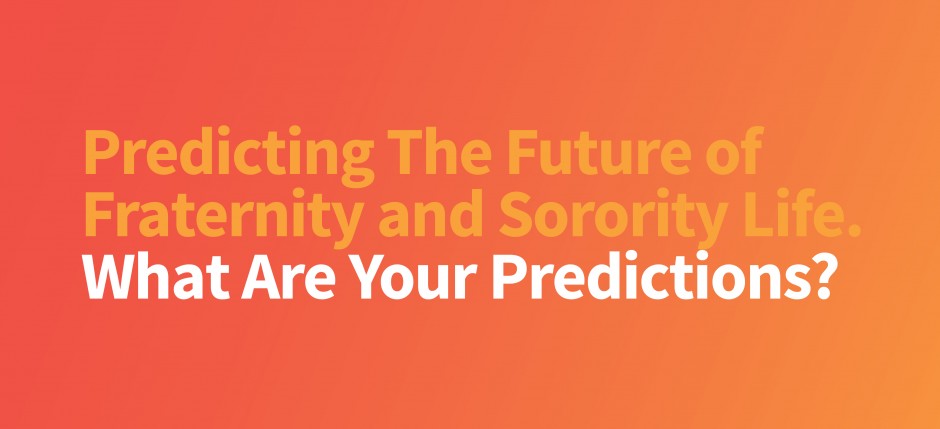
by Matt Mattson
I’m certain that 2020 is the future. I’ve been waiting for the future to arrive ever since I was a kid, and I’m 100% sure it’s now finally here.
As we roll into a new decade, allow me to try to predict the future (and consider how some of the most important trends will impact sororities and fraternities). This is just me having some phun and sharing some of the things I’ve been reading lately (lots of fun articles linked).
[Related Phired Up Blogs: Growth Technology: The Future of Fraternity & Sorority. Better Data, Better Members. Recruiting Generation Z. Get Back To Basics.]
These are 10 of my predictions. What are your yours?
Culturally-Based Organizations Will Be The Innovators. While most of the industry will be looking to the traditional “leaders” (big, old, wealthy organizations) to point the way, great innovation always happens when opportunity and hunger meet… That’s exactly where the suddenly maturing Latinx, Asian-Interest, Gender-Inclusive, and Multicultural organizations of today find themselves. Look to them to point toward the future of fraternity/sorority. Demographics and societal trends all seem to be creating a perfect incubator for explosive growth.
People (including students) Need Rescued From Pressure. We already know that today’s college students are dealing with more anxiety, depression, and other mental health challenges than any generation before. But this isn’t just about college students. It’s everyone. Part of our job at Phired Up/TechniPhi is to make people’s lives easier. We need to relieve the pressure (while everyone else seems to be amping it up). We need to pastor to and care for everyone we can. Fraternity/sorority members, in particular, will respond gratefully to anyone who can empathize with their daily reality and help relieve pressure (in practical ways — not just telling them “they matter”). Let’s relieve the pressure.
Folx Are Craving Humanity, Civility, and Genuine Connection. 2020 is an election year. Our society will be overflowing with vitriol, skepticism, #fakenews, anger, and tribalism. Meanwhile, today’s students are desperately looking everywhere for something real, something human, and something civil. Suddenly classic fraternity and sorority is wildly relevant! Suddenly brotherhood and sisterhood really mean something, especially when juxtaposed against the rage of the outside world.
New “Influencers” Will Emerge in Fraternity/Sorority. Influencer Marketing isn’t new, but it is only trickling into fraternity/sorority so far. 2020 will change that. YouTubers and TikTok and Instagrammers will take control of the story of fraternity whether we like it or not. We have to be at the front edge of influence. (*Note: The bit on “Augmented Reality” in that linked article has me thinking too, but our FSL world won’t start experimenting with virtual house tours and “imagine yourself in our letters” experiential marketing for a while now, in my opinion. They should, but they won’t.)
Partnership & Collaboration-Advocates Will Start To Emerge. I don’t have an article I’m going to reference here… I just predict that this will be the year when campuses and HQs are tired of positioning themselves against each other, and a few key players will emerge as leaders in bringing the industry together. I want us to play that role, of course, but others as well.
Higher Ed is Ready for Predictive Analytics (and we’re getting ready to deliver). Read this from a Digital Marketing Institute Article… “Analytics will also become a major, and mainstream, part of ensuring students are getting the most from education and graduating on time. By using predictive analytics institutions can provide students with support services before they encounter problems. For example, the University of Nevada is already using analytics to pinpoint when students need earlier intervention.” Phired Up & TechniPhi is working to create this for risk reduction and potentially other applications through our technology!
Reviews Reviews Reviews. We need more easily accessible, reputable, and relevant testimonials about fraternities and sororities. 68% of Gen Z read 3 or more reviews before buying something for the first time with their own money. GreekRank and other similar services will only increase in prominence and importance in the fraternity/sorority growth sphere. Not to mention the emergence of the Greek Life Scorecard from The Piazza Institute/Penn State becoming a REALLY important topic of conversation.
Artificial Intelligence Is Legitimately Impacting Higher Ed (and we need to be in the conversation). Read this from an Inside Higher Ed article “…as colleges work to connect the dots, by creating data warehouses that draw on activity across systems, sometimes in real time. And institutions are putting the data into the hands of administrators charged with student success, giving professors a richer picture of their students and, in some cases, letting students get answers to their questions in new ways. What makes this round of technology different is artificial-intelligence algorithms, which can bring raw numbers into focus in new ways and can detect patterns fast enough to make meaningful interventions. Connecting the dots can form a rich paint-by-number of each student, a portrait colleges hope will increase retention and deliver clear ROI on the tech investment. And every student saved from failure helps colleges maintain enrollment during this time of challenging demographics.” Imagine the applications of smart AI when it comes to risk interventions, retention interventions, and designing custom member education experiences based on individualized membership profiles!
DMs Are The New Org Fairs. Direct and private social media interaction is continuing to emerge in the corporate marketing world, and it will flourish in fraternity/sorority. If you don’t know how to build a names list (or a new member class) via IG direct message, it’s time to ask some undergrads for their advice. They’re already doing it and it’s changing the game. It’s not a bad thing either. There is genuine connection happening in a one-to-one engagement effort that is likely to lead to real face-to-face interactions!
Try Before You Buy. Colleges are starting to experiment with it (Arizona State has a whole online freshman year it offers that you don’t have to pay for until the end!). This article mentions it too. Some smart sororities and fraternities will start to experiment with alternative payment structures that aren’t fear based like the current models (front loaded to maximize payments by new members), but are value-centered and provide a major differentiating factor. This will be experimental for now, but it will push the dues structures of the future. For now, the most practical trend will be financial transparency! The Panhellenic world will lead this trend, and others will follow.
That’s it! Those are my 10 predictions. What do you predict?
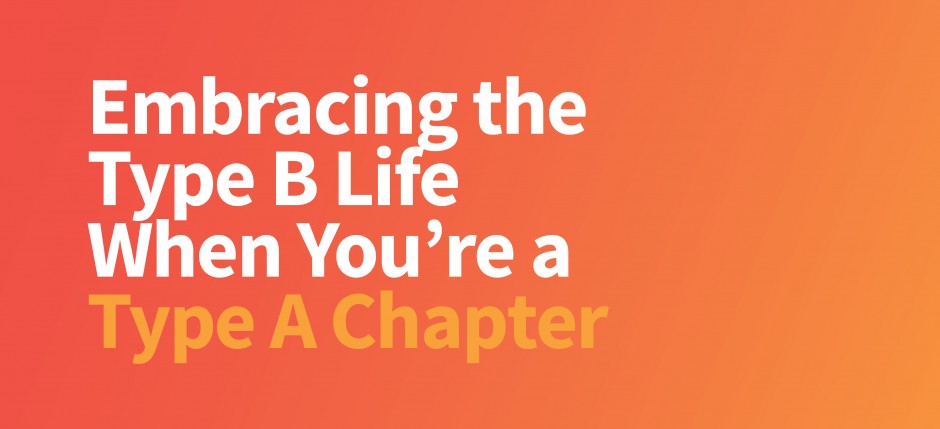
by Haley Cahill-Teubert
I was working on an entirely different blog piece earlier in the week that lead me to Google: “Characteristics of Type A personality”. Here is the result:
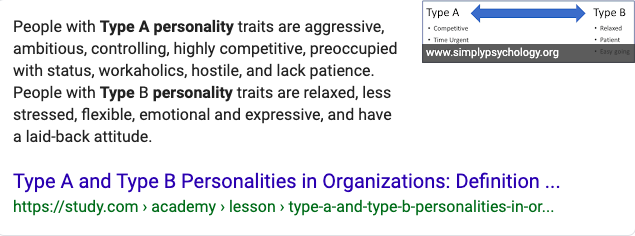
(Side note: Can my fellow Type A friends agree that “hostile” and “aggressive” aren’t the most flattering of adjectives to describe us?)
I did a bit more reading and found some other descriptions of Type A and Type B personalities.
Anyhow, when I read this my mind went straight to recruitment. If recruitment had two personality types, formal recruitment would totally be Type A and informal recruitment or continuous open bidding would be Type B.
When I think of formal recruitment on a large campus, I tend to associate it with words like: competitive, critical, fast-paced, time-bound. Sounds pretty Type A, right?
When I think of COB though, I associate it with things like: relaxed, laid-back, flexible. It kind of puts the (Type) B in COB, yes?
Just like Type A and Type B folks thrive in their own ways based on their own personality distinctions, chapters on campuses across the country thrive in different recruitment settings.
Some members and/or chapters like the neat and tidy structure that comes with a formal recruitment experience. It has time limits, rules and quotas. The details have been perfected–outfits, door stacks, clapping patterns–the works. It’s a fast-moving environment, with pressure to make fast connections via fast conversations. There’s an end goal and part of that goal is to come out on top. And I’m willing to bet the chapters with predominantly Type A members are the chapters who appreciate formal recruitment. (Is it possible to LOVE formal recruitment? Type A friends, let me know, please.)
Other individuals and/or chapters prefer the slower pace that comes with an informal recruitment process or COB where structure is loosely defined and pressure for perfection is minimal. Few things are timed, the need to be best is nearly non-existent and stress levels are low. Type B friends, am I speaking your language?
So why does this matter?
I’ve had some recent discussions with chapters who are participating in COB for the first time in years… Or ever. It was initially super interesting to me how overwhelming, stressful and unnatural COB feels for so many.
But then it started to make sense. Sure, a different recruitment structure (or lack thereof) can be stressful because it’s uncharted territory. But I also think it’s worth exploring that for many of these chapters, maybe that source of stress comes from simple personality differences. Perhaps COB is stressful for many of us because we are used to being in control, having rules, time limits, structure and competition. In true Type A fashion, it’s only natural for some of us to be anxious when we don’t have those things–those things are a large part of our identity, not just our recruitment preferences.
So how do you embrace the Type B recruitment life when you’re a Type A person, or part of a largely Type A chapter?
I could tell you you need to stop stressing. Relax. Embrace it. It’s got to be done. But if I know anything about Type A friends, I know that’s not effective.
Instead, let me offer these thoughts:
Speaking to your goal-oriented side, you’ll be happy to know COB is in fact very goal-oriented. The goal may be smaller in quantity, but that doesn’t make it smaller in quality. Maybe your goal in formal recruitment was to hit quota and welcome 100 new members into your chapter, but you welcomed 94. Sounds like it’s time to adjust the goal. New goal: 6. The number may change, but the quality of human you are recruiting does not.
Speaking to your competitive and status-minded nature, you may be interested to know COB has a surprising competitive edge. In formal recruitment, you likely feel the need to somehow be better than every other chapter. That spirit of competition exists in formal recruitment, but with COB, the only chapter you need to be better than is the one you were yesterday. COB is an opportunity to continue to grow your chapter by offering bids to extremely qualified women who will enhance your chapter in new ways. You get the opportunity to be better than you were the day prior by being in a position to extend bids to women who don’t yet belong to a chapter. You don’t have to wait a whole year to be better than you were yesterday. You get that opportunity with every opening you have and bid you extend.
Speaking to your controlling tendencies (sorry–there’s no pleasant way to say that), you’ll probably be happy to know that because COB is much more laid back and less time-consuming, you can allocate more time and energy to other areas in life you need to control. Many of us feel like formal recruitment tends to control our lives when it’s happening, rather than us controlling recruitment. You know what I mean–when our lives becomes constant states of song practice, outfit review and decor prep. With all the time spent on formal recruitment, we lose our grip on other things. How about a recruitment structure that allows you to have control over other areas of life while still meeting your chapter’s goals? COB for the win.
Speaking to your impatient side, COB may irk you a bit, but you know what might make you even more impatient? Countless standards meetings and chapter votes surrounding members who want to withdraw from your chapter. Retention workshops because people are experiencing misaligned expectations and want to leave the chapter. With COB, you can make more meaningful connections without the pressure of timed rounds, and you can portray your chapter and membership expectations more authentically… Which might just mean extending bids to people who have a really good grasp on what it means to be a member of your organization and who truly want that. More COB now might mean less headache later.
As you can see, there are a lot of benefits to COB. (The lack of frills is my personal favorite.) Maybe it’s uncharted territory, but rather than fear it, I encourage you to recognize which elements actually compliment your personality traits so you can embrace the Type B life (and be successful with it) when you’re more of a Type A human or chapter.
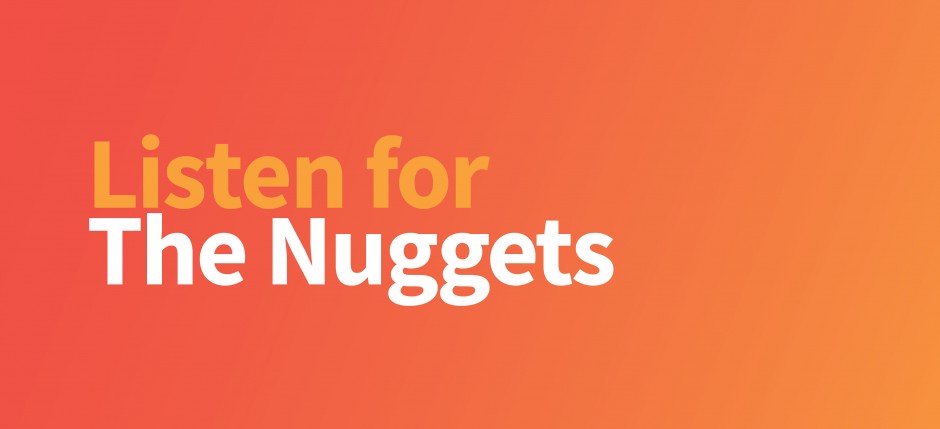
by Haley Cahill-Teubert
I read an article recently that dove into some unique universal habits in conversations. There was one in particular that caught my attention… the pattern of flipping the “right” to speak back and forth, with each turn lasting approximately two seconds (you read that correct… two seconds!) and the gap between those turns being a mere 200 miliseconds.
Perhaps the most insightful part of the entire article, though, were these sentences:
“Instead, they uncovered what Levinson describes as a ‘basic metabolism of human social life’ — a universal tendency to minimize the silence between turns, without overlaps. This means that we have to start planning our responses in the middle of a partner’s turn, using everything from grammatical cues to changes in pitch. We continuously predict what the rest of a sentence will contain, while similarly building our hypothetical rejoinder, all using largely overlapping neural circuits.”
Did you catch that?
We have to start planning our responses in the middle of a partner’s turn.
We do this all the time in recruitment. We ask what we think is a great question, but about 10 seconds into the response (at the most!), we mentally check out and begin thinking of a new question. Or, we do in fact hear something that resonates with us and we wait for a pause in the conversation to talk about ourselves.
The article even says that, too. “The only reason why we ask other people how their weekend was is so we can tell them about our own weekend.”
We listen to reply. We listen to talk about ourselves. We listen to fire another question at them.
This simply won’t work in a recruitment setting… or anywhere in life, really.
When we mentally check out of a conversation because we’re busy thinking of a response, we miss the nuggets. When we are afraid of pauses in conversation and jump in with a question before the PNM can complete her thoughts, we don’t just miss the nuggets–we don’t even give them a chance to happen.
The nuggets (gold nuggets, chicken nuggets–whatever you want to visualize here) serve as the bridge we need to take our conversations from surface level to seriously personal and memorable. These nuggets are so important. They are a little nugget of the PNM’s life, they’re offering them to you to take and dive into. Each nugget is full of potential that can lead to true connection.
But we miss the nuggets.
And here’s what happens when we miss the nuggets: We extend bids to members we don’t actually know anything meaningful about. On the flip side, we refrain from extending bids to potential new members who actually belong in our organizations, but we missed the opportunity to genuinely know them because we missed the nuggets.
Imagine the possibilities of improving our ability to grasp the nuggets in conversations. More leaders. Higher retention. Better sisterhood. Good chapter morale. You get the idea.
We’ve got to ask good questions in recruitment — we know this. But we’ve got to be good listeners too. Not just to hear and respond, but to hear and search for nuggets that we can grasp onto!
Approach conversations with the understanding that every single word a PNM shares is important and necessary in our quest to recruit members for a lifetime. Listen not to reply, but to understand, to learn and to make the PNM feel valued. Listen because recruitment is about a PNM, not about us. Listen for the things we want in a sister. Listen for the things we want in a friend. Listen for the things we need in our chapters. Listen for the nuggets.
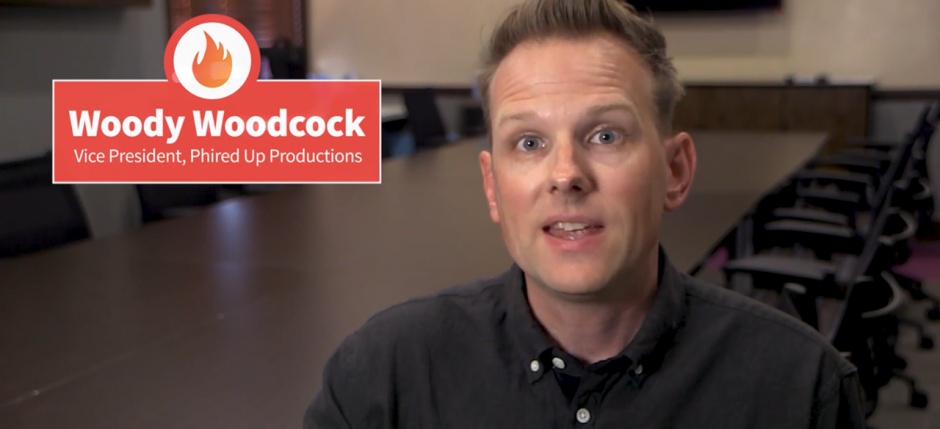
Great teams have great coaches. Who is coaching your team toward achieving your growth goals?
Recruitment (not to mention marketing, new member onboarding, and retention) are all highly specialized parts of the fraternity/sorority experience. Most people didn’t join a “recruitment club,” they joined a sisterhood or a brotherhood, and that means that the recruitment part of the experience doesn’t come naturally for most of our members. We’ve seen this come true for years — recruitment coaching is a key component to an organization’s long-term success.
At Phired Up, we believe that one of the 7 Indicators of a High Performing Growth System is Growth Coaching. Without positioning an advisor, a Phired Up expert, or some other professional as a long-term well-trained growth coach, an organization will almost always experience a high level of inconsistency. Our Phired Up team has been coaching fraternity/sorority headquarters staff and volunteers for years, and this premium service for headquarters remains in high demand because it delivers consistent, predictable, and above-industry-average growth results. We know that every chapter, every inter/national organization, and every council should have its own coach who is trained in the highly specialized skill sets that drive recrutiment results.
We train advisors to be coaches.
We coach headquarters professionals.
We coach inter/national volunteers.
We coach individual chapters.
We coach council and community leaders.
At Phired Up we believe in coaching as a vital ingredient in long-term growth. We are proud that our team of coaches, consultants, and recruiters are some of the most engaged, knowledgeable, and experienced professioanls available. But whether you engage us or find some other way to consume growth coaching, we know that your team deserves a coach that believes in you, challenges you, and helps you succeed at the highest level possible.
To learn more about growth coaching services from Phired Up, email info@phiredup.com or contact your Phired Up representative.
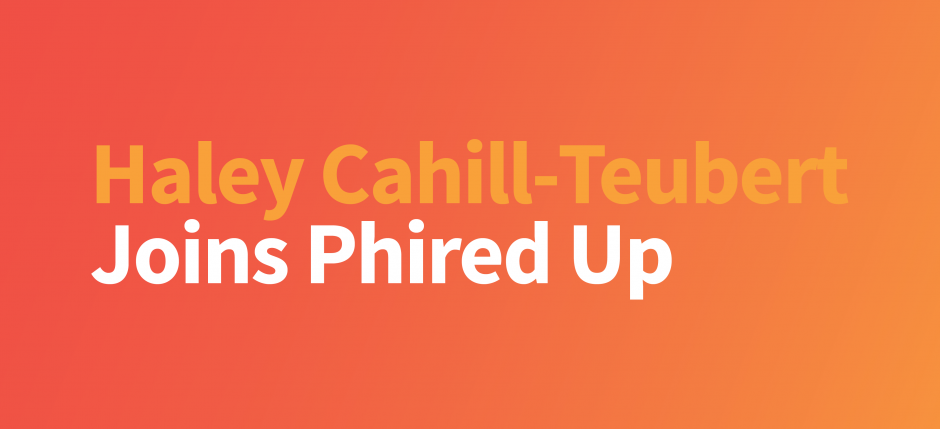
FOR IMMEDIATE RELEASE
Contact: Branden Stewart
Haley Cahill-Teubert joined the Phired Up team as an Organizational Growth Consultant effective May 20, 2019. Haley will join a robust and experienced team of Panhellenic sorority recruitment specialists to help deliver world-class training and coaching to our clients across North America.
“I am extremely excited to have Haley join the team! She was a standout candidate from the moment she applied and will bring years of skills, experience, and ideas to continue taking our team to the next level,” said Jason Allen, Director of Education for Phired Up.
Haley is a 2015 graduate of Appalachian State University where she earned her BS in communication with a concentration in journalism and joined Alpha Omicron Pi.
After earning her degree, Haley joined the Alpha Omicron Pi staff as the Assistant Director of New Chapter Development, where she worked with Alpha Omicron Pi chapters five years and younger. Soon after joining the Alpha Omicron Pi team, she transitioned to a role as the Assistant Director of Communications and Editor of the organization’s international magazine. Haley has served in that role for the last three years, and comes to Phired Up with a deep understanding of the sorority recruitment world.
“We are so excited to have Haley join the team and continue the legacy of world class Phired Up female trainers our industry has come to know,” said Dr. Colleen Coffey-Melchiorre, a long-time Phired Up trainer and co-author of I Heart Recruitment. “Haley is poised, curious, funny and will be a dynamic addition to our roster. Her ability to serve a unique set of clients is what I’m most excited about along with her strong background in marketing and communication.”
Outside of work, Haley enjoys health and fitness, and is a certified personal trainer through the American Council on Exercise and a certified Women’s Health Specialist through the National Academy of Sports Medicine. She also loves to cook, bake and travel. Haley lives in West Virginia with her husband Chris. Haley has an active social media presence; follow her personal Instagram account @haleybcahill, but also be sure to check out her @coffeecupsandcookbooks personal project where she explores her culinary side.
“Haley brings an electric energy, genuine kindness, a zest for life (and cooking!!), and a true passion for bettering the fraternity and sorority experience through education and experiential learning opportunities,” said Abby Ford, who works alongside Haley as a specialist in sorority growth education. “Haley embodies social excellence to her core, and I’m so excited both learn from and grow with Haley as we continue to focus on bettering educational opportunities for all Pahnellenic sororities.”
“I am so excited to join the Phired Up team because I love the commitment Phired Up has to making the recruitment experience a meaningful one that fosters organizational growth and lifelong relationships,” said Haley. “Joining a sorority completely altered my college career, and it continues to positively shape my life well after graduation. It’s my sincere hope that each sorority woman and fraternity man have an equally impactful and enriching membership. I believe that starts with an exceptional recruitment experience, and I’m excited to have a hand in that!”
Matt Mattson, Phired Up’s co-founder and President added, “I’m really proud of Haley and our entire team of Panhellenic marketing, recruitment, and retention specialists. We have a group of no-nonsense educators who genuinely want to put more humanity, more authenticity, and more heart into the way people join sororities in 2019 and beyond. We’re building modern solutions for modern organizations, and we’re doing it in sophisticated ways. I’m thrilled to have Haley join our team.”
Please help us welcome Haley to the team by sending her a welcome note at Cahill@PhiredUp.com, and read Haley’s first blog post called Recruitment Rounds & Wedding Bell Sounds here.
# # #
About Phired Up Productions: Phired Up Productions helps fraternities and sororities grow. The company’s products, services, and brands are creating the future of fraternities and sororities by transforming the way people join. The company delivers relationship-focused, data-driven, results-producing TECHNOLOGY, EDUCATION, and STRATEGY solutions for every aspect of the pre-member experience from first-impression through initiation.
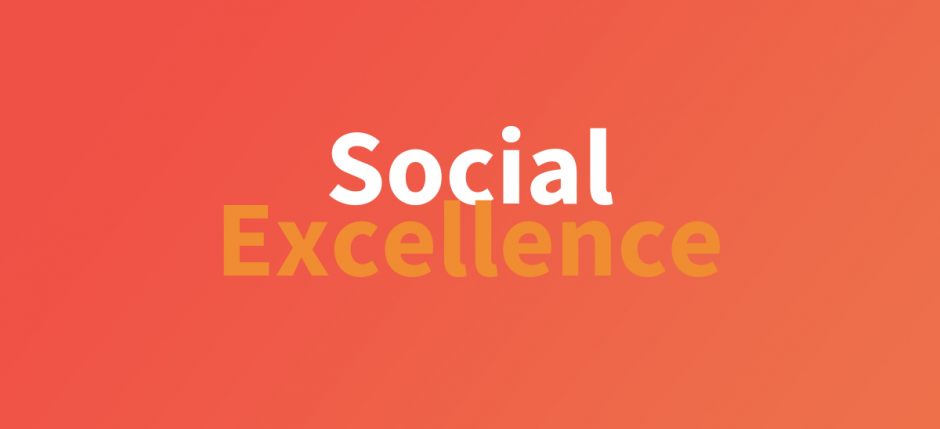
No matter how your organization attracts, selects, and secures its newest members, fraternities and sororities that effectively put the right amount of the right people into their chapters understand that there is a fine art of organizational growth.
When Phired Up first started, we only taught about the “science” of growing Greek Life. We talked about the systems, the processes, the measurables, and the tactics. But soon we learned that it was just as important to teach the finer points… the social skills, the mindset, the philosophy, the belief system, and the intention. This is how Social Excellence was born…
Social Excellence [n]: A state of perpetual generosity, curiosity, positivity, and openness to limitless possibility.
A desire to intentionally connect with others. The ability to engage in deep, meaningful conversation.
Acting in a responsible and respectable manner, with high expectations of others. Being authentic and living everyday with integrity as the best version of oneself.
Being confident and vulnerable. Being fun and compassionate. Being open, kind and bold.
The deepest level of societal participation and contribution.
Fraternities and sororities are in the relationship business. We deal in human connection. These things we call “Brotherhood” and “Sisterhood” are code words for meaningful, love-filled, purpose-driven, sincere human connection. Organizations that are great at growing their membership understand that their number one goal should be to build a system of authentic relationships. Organizations that are great at growth start by giving away the feeling of “Brotherhood” and “Sisterhood” generously to potential members.
Social Excellence challenges fraternity and sorority members to engage prospective members with intention – always seeking real human connection. Social Excellence reminds fraternity and sorority members that every person we encounter is full of a lifetime of stories and lessons that we can connect with if we choose to be curious. Social Excellence pushes fraternity and sorority members to be real, authentic, not-fake, sincere in all our interactions with potential members (because then they’ll be that way with us). Social Excellence gently encourages fraternity and sorority members to choose to be vulnerable in our interactions with prospective members because they aren’t seeking a club to join, or a t-shirt to wear, or a house to live in – they’re seeking belonging and purpose, and those things can only be shared with a healthy dose of vulnerability.
Every moment is a choice. We can choose to engage with the people around us or not. We can choose to care about every person and every conversation or not. We can choose to open ourselves up to others or not. We can choose to be average or not (but our founders didn’t create our organizations so that we could be average together). You’re a member of a social fraternity or sorority (or at least that’s part of what your organization is about). Don’t be socially average. Be Socially Excellent and watch how that transforms the way you grow.
Social Excellence In Marketing
Great marketing is personal. Great marketing puts the “buyer” at the center of the strategy. Great marketing is not a shout (like “GO GREEK!”), it is like a whisper in a person’s ear that tickles their heart and inspires them to act because they know that action will make their life better. The way fraternities and sororities do marketing should be oozing with Social Excellence. Make your Greek Life marketing personal. All your marketing efforts should make it easier for human connection to happen between your best members and the prospects you’re marketing to. Great fraternity/sorority marketing should start with Social Excellence at its core.
Social Excellence In Recruitment
Getting your members to make the choice to engage, the choice to be curious, the choice to be generous, the choice to be authentic and vulnerable will make all the difference in recruitment. Social Excellence is the core operating philosophy of great recruiting chapters. Phired Up teaches a lot about what to do in recruitment… and Social Excellence provides guidance on how to be in recruitment.
Social Excellence teaches members to make recruitment experiences comfortable for the prospect, overflowing with kindness and thoughtful touches, celebratory of the uniqueness of each individual, and respectful of the insecurities and hidden realities of each human in the process. We are all just humans recruiting other humans to an organization that tries to make us better humans after all. Don’t take the humanity out of it.
The goal of fraternity/sorority recruitment events, interactions, processes, informational sessions, or “rounds,” should always be one thing: meaningful, authentic, real human connection. Remember, we’re in the relationship business. We’re most successful when instead of trying to impress others, we try to connect with others.
Social Excellence in New Member Onboarding
A member’s first semester is always the greatest and hardest (for a million reasons). Preparing your newest members to be Socially Excellent can be one of the most powerful gifts you can offer. Teaching new members the art of human connection, the power of their momentary choices, and the little things they can do to put relationships at the center of their college experience is a powerful gift. We also know that when chapters create an atmosphere of Social Excellence, there is far less chance that new members will be taken advantage of because there is a trusting environment built from a culture of care that naturally flows from the philosophy of Social Excellence.
Social Excellence in Retention
One of the primary reasons people quit fraternities and sororities is because of a “lack of connection.” Far too often new members join an organization, but never find themselves in a “friend group” or with a very close friend in the chapter. When that happens, they very often choose to quit or disengage. Too often fraternities and sororities don’t deliver on the promise of sisterhood or brotherhood to new members, because we forget that being brothers and sisters doesn’t happen all by itself. We have to create that sense of connection, that sense of belonging, and that sense of shared purpose.
Make the choice to continually, consistently, and intentionally do personal relationship-building work with your members. Not just big events where everyone comes together or group text chains… we mean coffees, lunches, long dinners, quiet conversations, small group fun, road trips, and as many real, meaningful, joy-or-pain-filled conversations as possible.
Social Excellence Was Born From Fraternities and Sororities
This message that we teach to thousands of people every year, Social Excellence, was born from the way we’ve seen great fraternities and sororities grow.
The story of almost every fraternity or sorority is similar. It started with a handshake between a couple of people. They had a conversation about what could be. They built a trust filled relationship and decided to collaborate together to build something new. Then they turned around and shook more hands, had more conversations, built more relationships, and gathered more people together in an organization.
Margaret Mead once said, “Never doubt that a small group of thoughtful committed citizens could change the world. Indeed it’s the only thing that ever has.”
Handshakes lead to conversations. Conversations lead to relationships. Relationships often lead to collaboration. Collaboration very often results in organizations. And organizations like fraternities and sororities change lives and change the world.
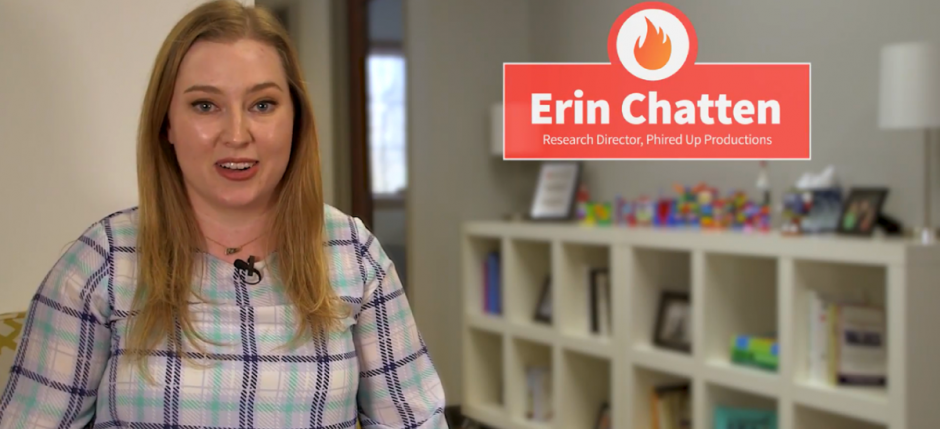
Before you read this, you should know that this post also exists: CLICK HERE. That core data about Gen Z is really important for you to consider. Another related post comes from a presentation we delivered not too ago. It’s titled “Damaged Goods” and dives deeper into some of the data about today’s incoming college students and all that they’re experiencing (CLICK HERE). (Oh, and here’s another recent post that outlines some important stats about today’s students).
And finally, before you dive into this blog post, watch this video:
Now for the rest of the blog! Enjoy!
We probably don’t need to tell you all the facts about Generation Z… for many of you in college now, you are a Gen-Zer (or on the cusp). But you might not be aware of the characteristics of your generation that have an impact on how we recruit. We believe some of the most important generational trends that impact fraternity/sorority recruitment are:
Financial awareness (they’re children of the financial crisis).
Gen Z has a similar “anti establishment” mentality as Gen X (your parents most likely). They’re less attracted to big groups and are more interested in value-added, personal relationships.
They tend to be information seekers (and finders). They’re digital natives and know how to access all the information they need.
They have a strong thirst for making sure things are “worth it.” This generation is highly driven, career-focused, and entrepreneurial. They’re seeking opportunities to help set them up for a successful life, and if they can’t find it it, they’ll create their own.
That’s just the tip of the iceberg. Let’s dive deeper.
We’ve not only looked at the wonderful research being done out there on Gen Z students… we’ve also been asking students directly. Specifically, we conducted a major national survey of high school students recently. These results are not officially published yet, but let us give you a quick sneak peek.
Quick Demographics: Approximately 2,000 surveys from HS aged students (freshmen-senior). Balanced collection from each region and international responses.
Most used social media platform: 85.7% Instagram, 74.3% YouTube, 58.6% SnapChat
Top communication method with friends- 74.7 % Text, 71.5% Face to face, 60.0% Instagram DM
Hope to receive from college: 49.3% A memorable experience, 48.3% Professional/career development, 31.0% new friends
Top concerns for college: 67.3% affording college, 48.0% failing classes, 28.0% feeling alone. 3.6% being hazed
Words they associate with F/S: 65.6% cliques, 33.5% conformity
Where they learn about F/S: Movies 67.2%, TV 55.6%, Instagram 33.2%
There’s lots more to come from these survey results. We’re learning a ton from the data as we dive deeply into it. Without getting too detailed (because this is supposed to be a quick blog post), here are some big lessons that high schoolers seem to be teaching us right now.
We are in the experience economy. The number one thing this next group of students entering college want is a memorable experience. In other words, our marketing and recruitment efforts shouldn’t be about conveying information, they should be emotional and focused on creating experiences that add value to the PNMs lives.
Affording college is their number one concern. That’s not a shocker at this point. But in a long list of concerns they had to choose from, being hazed only had 3.6% of respondents select it. That tells us that despite the fact that they’re learning all about fraternities and sororities primarily from movies and TV, they aren’t internalizing the darkest story lines. They don’t hate us (yet). Let’s keep it that way, eh?
50.3% have a high or neutral level of interest in fraternity and sorority life.
Like we said, there’s lots more to come from this, but it’s an exciting start!
O.K., so let’s get really specific. Here are our top tips for recruiting TODAY’s students. We have to update our strategies and tactics to match the needs of these students.
Make It Personal. Don’t group text, mass email, Insta tag, or Facebook invite. They won’t be attracted to the large group feeling, they want a personal invitation. They’ll want to know that you want to build a friendship with them, not a mass of surface level friendships.
Identify the Value. This should be what we focus on the most. In their mind they are doing the cost benefit analysis about whether it’s worth it or not to join. Remember, you are asking for important resources – time that they could be spending on studying or advancing themselves and money when an education already has a costly pricetag and they’re top concern is affordability.
Don’t Forget The Fun. The value and worth are crucial to highlight and focus on when recruiting. But we can’t forget about the fun. They want to have a memorable experience but one that doesn’t take away from their future.
Stand Out. There are so many involvement opportunities on a campus to choose from… and many of them are free. How do you stand out as different from the other organizations? What do you offer that they don’t? It has to be more than “buddies.” You are a premium organization, so make sure they know what makes membership priceless.
In Person. Of course this generation uses digital more than any before it, but they value true in-person, human-to-human connection more than anything they see on social media. Remember, they grew up with “fake news,” so what you post on-line better be backed up by real-life experiences.
Use Authentic Video. No I’m not talking about flashy, expensive, Hollywood style sorority recruitment videos (necessarily). The Gen Z audience is on YouTube more than any generation before them. They are following vloggers, tutorials, real people - not music video-esque recruitment videos. Type “sorority recruitment” into YouTube and you will find popular vloggers giving incoming freshmen tips on makeup and fashion, what things to say or not say. Is that the content we want to be dominating the web search? We should be making our own, real “vlog-style” videos that give PNMs a better idea of what recruitment and membership will be like.
Explain Selection. These are information seekers; when we lie to them and don’t provide more detail about how selections are made, we lose them as members. Using phrases like “trust the process” and “some people slip through the cracks” aren’t cutting it.
Highlight Academics. Make sure you are including how your organization is helping with academics. Career success and getting good grades is a top priority – they know how much their education costs and are taking it seriously. If you come across as an organization who only parties, many students won’t be interested.
Focus on Individuality (or highlight it).Gen Z students are individuals, and want to hold their individuality. They aren’t interested in organizations that make them have to conform and often see fraternity and sorority as places where that is true. Focus on the diversity represented in your chapter and be open to recruiting people who are different.
Correct Their Assumptions. Most of what students learn about fraternity/sorority is from movies, TV shows, and Instagram accounts. When a potential member looks at your social media or meets your members, are they reminded of the negative stereotypes they assumed were true?
Have Accurate Information Easily Accessible. These students are going to want to learn whatever they can online. Thats a scary thing… Googling fraternity/sorority currently doesn’t result in the marketing narrative we all have in mind. What information do they need and how can we provide it to them during their web search?
This is all happening RIGHT NOW! It’s exciting and important. But if you get super nerdy about this stuff and want to go deeper, will you consider for a moment how this generation (and the next) will likely transform our whole industry? Here are some guesses…
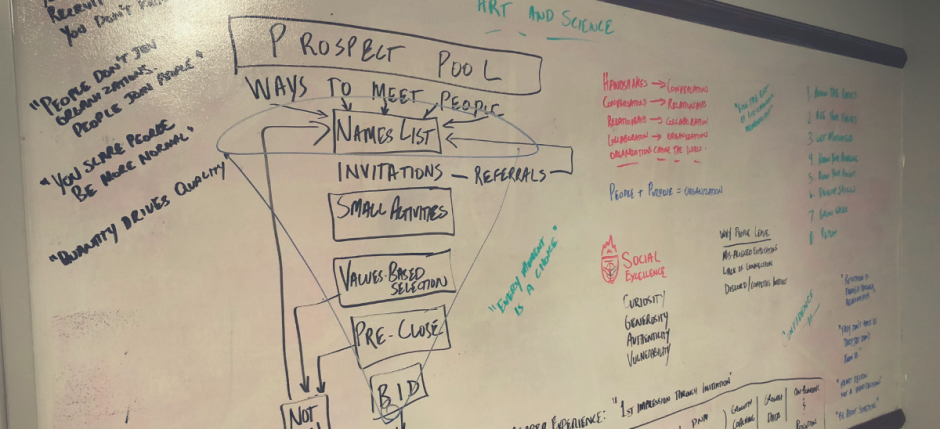
by Matt Mattson
Sororities and fraternities are entering a new era. Are you ready for it?
If you’re a fraternity/sorority leader right now, you might not be fully aware of the challenges that await you. I don’t want to be the bearer of bad news, but I do want to make sure you’re fully in the know. Let me share some truth with you real quick.
Our organizations are experiencing something they’re not used to: a stagnating market due to lower enrollment, changing student demographics, and (to some extent) reputation challenges. After 15+ years of upward membership growth, many organizations are tapering off or being confronted with the pains of membership decline.
This past year has been particularly challenging for many organizations. I’ve seen reports from national fraternity/sorority associations that make it clear that membership decline (or at least a clear plateau) is becoming the new reality. I’ve had anecdotal conversations with executive directors that tell me they’re losing major membership numbers through an increase in chapter closings, a reduction of recruitment demand, and an increasing problem of first semester member retention (new members are seeing their first semester as a “trial period”).
Generation Z is showing up to college with a demand for more culturally blended organizations, a demand for a direct return on investment, and a demand for modern organzations that meet their modern needs. Fraternities and sororities are, in many ways, struggling to keep up with this demand. Far more could be written on this topic alone (more info referenced in a link below).
We have been studying the marketplace both formally and observationally for over 16 years. Our company makes it our job to understand growth trends and the factors impacting them. Here are just a few other little nuggets to help you understand the reality in which you’re operating as a fraternity/sorority leader.
So, if you’re a student leader (or a professional, for that matter), what do you do? There are a lot of challenges out there for you to face, but the truth of the matter is that fraternity and sorority, at its core, remains the same – we are in the relationship business.
It’s time for our organizations to GET BACK THE THE BASICS. We’ve grown lacksidasical over the past couple of decades (this isn’t your fault, obviously). Our organizations have grown used to high student enrollment and high demand. Because of that we got a little lazy. We can’t keep doing that and hope it’s going to work.
There is one path to success for our historic organizations that we love so much.
The picture that is attached to this post is from a work day our Phired Up team had in the office recently. We tried to outline, as simply as possible, our core philosophy that gets taught in everything that we do. No matter who we’re working with, whether it’s marketing, retention, on-boarding, technology, recruitment… whether its IFC, NPHC, Panhellenic, MGC, Local, north, south, east, west, PFA, NALFO, NAPA, AFA, AFLV, CCWL, SEIFC, etc., we always find ourselves going back to our core concepts.
You don’t have to understand everything in the picture. You don’t have to have read everything we’ve ever written or seen a Phired Up program. Let me give you a primer:
Focus on relationships. Meaningful relationships.
Systemize relationships for your organization. Maximize the amount of meaningful human connection that happens between your members and other human beings.
Shake more hands. Have more (great) conversations. Deepen your relationships constantly.
Don’t try to impress people, connect with people.
Fraternity and sorority is a relationship business. If you want to attract the right people to your organization, focus entirely on relationships. If you want to be a great leader, focus entirely on relationships. If you want to retain your members, focus entirely on relationships. If you want to help your members make healthier decisions, focus entirely on relationships.
Brotherhood. Sisterhood. These are just synonyms for relationships. Real, meaningful, heartfelt relationships that last and that are built around a common agreement on a way of living life.
It’s time to get back to the basics in fraternity/sorority. We have to be disciplined about consistently teaching the core elements of our organizations. People and purpose. Relationships that matter.
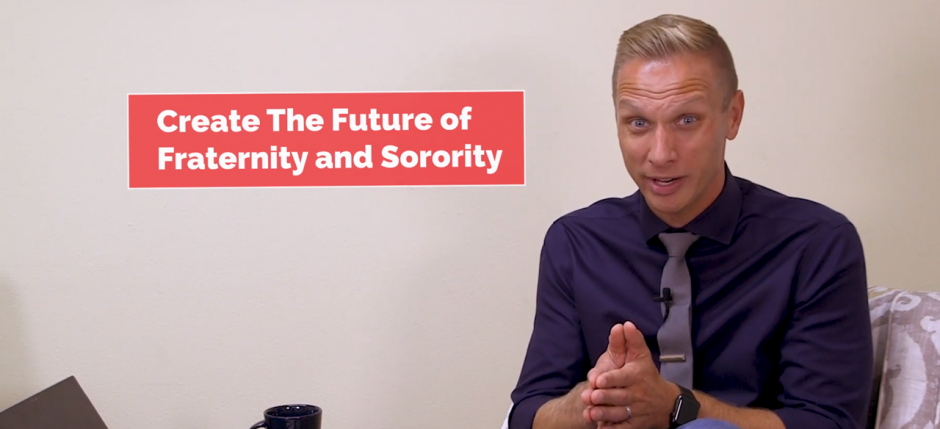
by Matt Mattson
Today’s fraternity and sorority leaders, that I talk to… they’re inventors, they’re originators. They’re some of the most driven, brilliant, and thoughtful people I know. They’re trying to build modern organizations for modern students. They’re not stuck in “history” or “tradition.” On the contrary…
They’re ready to create the future of fraternity and sorority.
Here’s the thing. I’m 100% convinced that the way to create that future is to TRANSFORM THE WAY PEOPLE JOIN.
Let me explain.
Great organizations are made of great members, right? Healthy, safe, thriving fraternities and sororities are made up of healthy, safe, smart members who understand the expectations of what it means to live as a sorority woman… to live as a fraternity man.
But to be honest, right now… too many of the wrong people are joining with the wrong expectations about what it means to be a member.
Listen, before I say any more, let me say that none of this is your fault… I think we ask way too much from our undergraduate fraternity and sorority leaders. We’ve given you 150 years of problems and the worst reputation in our industry’s history, and we’ve asked you to fix all that in your “spare time” between classes. I’m sorry. You didn’t ask for this burden of creating the future of fraternities and sororities, but because I’ve talked with a lot of you… I know you’re ready for it… and we’re ready too.
It will require a full transformation of how people join. It will require strategies that are smarter, more relationship-oriented, more data-driven, and more focused on putting the RIGHT people in your chapters. It will require informing and empowering potential members in ways that we’ve never done before. It will require a shakeup of systems and a great big overhaul of processes…
But we can’t just keep doing things like we’ve always done and expect our problems to go away.
We have to transform. And it absolutely starts with revolutionizing who we invite into our organizations and how we go about doing that. Changing the way we market to, recruit, select, and on-board our newest members is the one way I know for sure that we can make a major impact on the overall health and well-being of our organizations.
Let’s start a conversation. We know that there are SEVEN INDICATORS of a high-performing fraternity/sorority growth system. If you want to be “on system,” we want help you fulfill all seven indicators listed below.

Fraternities everywhere are starting to adopt a “PNM Orientation” session or a “Recruitment Kickoff” event (read more about “structured IFC recruitment”). These events are often well-intentioned (IFC’s want to set high expectations, educate prospective members, and give every chapter an opportunity to share their story), but too often these events result in a lackluster experience for the potential members. They can be full of boring presentations from ill-prepared chapter members with broken audio/visuals, they can be well-meaning professionals who end up lecturing students on stuff they haven’t even done wrong yet, or maybe even worse, they can set a tone of “fun buddy-club” that makes Potential New Members confused about what a fraternity is.
Phired Up offers a PROFESSIONAL SPEAKER who can provide an unforgettable program for PNMs and members. Our fraternity trainers will work with you to build a custom experience that sets the perfect tone for your recruitment process. We will deliver funny, engaging, powerful education about “What it means to be a fraternity man,” “How to have meaningful conversations during recruitment,” “How to be an educated potential member,” and more. We can also incorporate our Social Excellence message and facilitate real conversations between PNMs and members — conversations that go beyond “What’s your major?” “Where you from?” and “Did you play sports in high school?”
There are three keys to a great RECRUITMENT KICKOFF: 1) Expectations, 2) Education, and 3) Engagement. The KICK-OFF isn’t a time to dump information on the PNMs. It’s a time to help them experience the EXPECTATIONS of what it means to be a fraternity man, to EDUCATE them on how to find a healthy chapter that’s a perfect fit for them, and to ENGAGE them in real conversation with one another and with members of the fraternity community.
A great RECRUITMENT KICK-OFF can create healthier and safer chapters. A great RECRUITMENT KICK-OFF can increase retention of your best members. And a great RECRUITMENT KICK-OFF can make the recruitment process significantly better all around for everyone involved.
To book your Phired Up Recruitment Kick-Off, contact Austin Netherton (Austin@PhiredUp.com) or Matt Farrell (Farrell@PhiredUp.com).